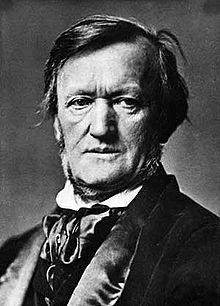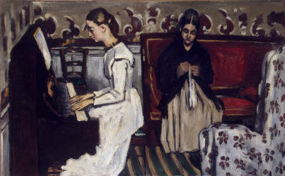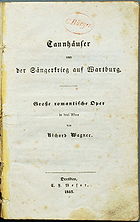- Tannhäuser (opera)
-
Richard Wagner  Operas
Operas- Die Feen (1833)
- Das Liebesverbot (1836)
- Rienzi (1840)
- Der fliegende Holländer (1843)
- Tannhäuser (1845)
- Lohengrin (1848)
- Tristan und Isolde (1859)
- Die Meistersinger von Nürnberg (1867)
- Der Ring des Nibelungen:
- Das Rheingold (1869)
- Die Walküre (1870)
- Siegfried (1871)
- Götterdämmerung (1874)
- Parsifal (1882)
Uncompleted operas
- Die Laune des Verliebten (1830)
- Männerlist grösser als Frauenlist (1838)
Tannhäuser (full title Tannhäuser und der Sängerkrieg auf Wartburg / Tannhäuser and the Singers' Contest at Wartburg) is an opera in three acts, music and text by Richard Wagner, based on the two German legends of Tannhäuser and the song contest at Wartburg. The story centres on the struggle between sacred and profane love and redemption through love, which is a theme running through most of Wagner's mature work.
Contents
Composition history
The original version
Heinrich Heine had provided Wagner with the inspiration for Der fliegende Holländer and Wagner drew on the same source for the plot of Tannhäuser: Heine's sardonic poem Elementargeister, telling of the lure of the grotto of Venus, was published in 1837 in Der Salon. Wagner also drew material from E. T. A. Hoffmann's story The Singer's Contest and Ludwig Tieck's 1799 story Faithful Eckhart and Tannhäuser. Other possible sources include the 15th century folk ballad Das Lied von dem Danheüser[1] and Ludwig von Bechstein's collection of Thuringian legends Der Sagenschatz und die Sagenkreise des Thüringerlandes.[2] Wagner wrote the prose draft of Tannhäuser between June and July 1842 and the libretto in April 1843.[3]
The libretto of Tannhäuser combines the mythological element of German opera and the medieval history of French Grand Opera. Wagner brings these two together by constructing a plot involving the 14th century Minnesingers and the myth of Venus and her realm of Venusberg ('the mountain of Venus'). Both the historical and the mythological are united in Tannhäuser's personality; although he is a historical poet composer, little is known about him other than myths that surround him. Furthermore, half of the opera takes place in a historical setting, and half takes place in the mythological Venusberg.
Wagner began composing the music during a vacation in Teplitz in the summer of 1843 and completed the full score on 13 April 1845; the opera's famous overture, often played separately as a concert piece, was written last.[4] The instrumentation also shows signs of borrowing from French operatic style. The score includes parts for on-stage brass; however, rather than using French brass instruments, Wagner uses twelve German waldhorns. Wagner also makes use of the harp, another commonplace of French opera.
Dresden première
The first performance was given in the Royal Theater in Dresden on 19 October 1845. The composer Ferdinand Hiller, at that time a friend of the composer, assisted in the musical preparations for the production. The part of Elizabeth was sung by Wagner's niece Johanna Wagner; Wagner had intended to premiere the opera to mark Johanna Wagner's 19th birthday on 13 October, but she was ill, which forced its postponement for six days.[5] Venus was created by Wilhelmine Schröder-Devrient, and the title role was taken by Josef Tichatschek. The performance was conducted by the composer.[6] Tannhäuser was not the success that Rienzi had been, and Wagner almost immediately set to modifying the ending, tinkering with the score through 1846 and 1847.
This version of the opera, as revised for publication in 1860 (including some changes to the final scene) is generally known as the "Dresden" version.
The Paris version
Wagner substantially amended the opera for a special 1861 performance by the Paris Opéra, requested by the French emperor Napoleon III at the instigation of Pauline von Metternich, wife of the Austrian ambassador to Paris. This revision forms the basis of what is now known as the "Paris version" of Tannhäuser.
Wagner had originally hoped the Parisian première would have taken place at the Théâtre Lyrique; however since the work was to be presented at the Paris Opéra the composer was required to insert a ballet into the score, according to the traditions of the house. Wagner agreed to this condition since he believed that a success at the Opéra represented his most significant opportunity to re-establish himself following his exile from Germany. However, rather than play the ballet in its traditional place in Act II, he chose to place it in Act I, where it could at least make some dramatic sense by representing the sensual world of Venus's realm. Thus in Tannhäuser the ballet takes the form of a bacchanale.
The changes to the score in the Paris version, apart from the ballet, included:
- The text was translated into French (by Charles-Louis-Etienne Nuitter and others).
- A solo for Walther was removed from Act 2.
- Extra lines for Venus following Tannhäuser's "Hymn to Love" were added.
- The orchestral introduction to Act 3 was shortened.
- The end of the opera was remodelled to include Venus on stage, where before the audience only heard the Venus motif. Wagner thought that prior to the change, audiences were confused about what was happening onstage.
The Paris première
Tannhäuser's first performance in Paris was given on 13 March 1861 at the Salle Le Peletier of the Paris Opéra. The composer had been closely involved in its preparation and there had been 164 rehearsals.[7]
However, there was a serious planned assault on the opera's reception by members of the wealthy and aristocratic Jockey Club. Their custom was to arrive at the Opéra only in time for the Act II ballet, after previously dining, and, as often as not, to leave when the ballet was over. They objected to the ballet coming in Act I, since this meant they would have to be present from the beginning of the opera. Furthermore, they disliked Princess von Metternich, who had promoted the performances, and her native country of Austria. Members of the Club, therefore, led barracking from the audience with whistles and cat-calls. At the third performance on 24 March, this uproar caused several interruptions of up to fifteen minutes at a time. As a consequence, Wagner withdrew the opera after the third performance.[8] This marked the end to Wagner's hopes of establishing himself in Paris, at that time the centre of the operatic world.
Performance history
A few further changes to Tannhäuser were made for an 1875 performance of the opera in Vienna, carried out under Wagner's supervision. These included linking the end of the overture to the start of the opera proper. The 1875 Vienna version is that normally used in modern productions of the "Paris" version, often with the reinstatement of Walther's Act 2 solo.[9] Wagner remained unsatisfied with the opera. Three weeks before he died, his wife Cosima noted in her diary that "He says he still owes the world Tannhäuser" (23 January 1883).
Other premières
First performances of the "Dresden" version" of Tannhäuser were given in Riga on 18 January 1853, the first performance abroad; in Prague on 25 November 1854 at Theatre of the Estates; in New York on 4 April 1859 at the Stadt Theatre, the first performance in the United States; in Bologna in 1872 at the Teatro Comunale, the first performance in Italy under conductor Angelo Mariani; in London on 6 May 1876 at the Royal Opera House, Covent Garden, the first performance in England; and in Sydney on 14 January 1901 at the Royal Theatre, the first performance in Australia.
Premieres of the "Paris" version were given in New York at the Metropolitan Opera on 30 January 1889 and at London's Royal Opera House on 15 July 1895.
Roles
- Note
- Although the libretto and the score always use the single name Tannhäuser in stage directions involving the title character or in indicating which passages are sung by him, that name never appears as part of the lyrics. Rather, each character who addresses Tannhäuser by name uses the given name Heinrich.
- The distinct character Heinrich der Schreiber sings many melodies distinct from all other named characters, and occasionally unique lyrics. However, in the libretto he finds individual mention only in the list of characters, with the ensemble numbers that include him being labelled for the Ritter (i.e., "knights", referring to the Minnesinger, who all share knightly rank). The score (at least in the Schirmer edition) labels his melody line simply "Schreiber".
Role Voice type Premiere Cast
20 October 1845
(Conductor: Richard Wagner)Revised version
Premiere Cast, 1861
(Conductor: Pierre-Louis Dietsch)Tannhäuser, a Minnesinger tenor Josef Aloys Tichatschek Albert Niemann Elisabeth, the Landgrave's niece soprano Johanna Wagner Marie Sasse Venus soprano or mezzo-soprano Wilhelmine Schröder-Devrient Fortunata Tedesco Wolfram von Eschenbach, a Minnesinger baritone Anton Mitterwurzer Morelli Herrmann, Landgrave of Thuringia bass Georg Wilhelm Dettmer Cazaux Walther von der Vogelweide, a Minnesinger tenor Max Schloss Aimes Biterolf, a Minnesinger bass Johann Michael Wächter Coulon Heinrich der Schreiber, a Minnesinger tenor Anton Curty König Reinmar von Zweter, a Minnesinger bass Karl Risse Freret A young shepherd soprano Anna Thiele Reboux Four noble pages soprano, alto Nobles, knights, ladies, pilgrims, sirens, naiads, nymphs, bacchants; In Paris version, also the Three Graces,
youths, cupids, satyrs, and faunsSynopsis
- Place: near Eisenach
- Time: early 13th century
Act 1
The Venusberg, (the Hörselberg of "Frau Holda" in Thuringia, in the vicinity of Eisenach)
Tannhäuser is held there a willing captive through his love for Venus. (Ballet scene; bacchanalian music.) Following the orgy of the ballet, Tannhäuser's desires are finally satiated, and he longs for freedom, spring and the sound of church bells. Once again he takes up his harp and pays homage to the goddess in a passionate love song, which he ends with an earnest plea to be allowed to depart. When Venus again tries to charm him, he declares: "My salvation rests in Mary, the mother of God." These words break the unholy spell. Venus and her attendants disappear, and he suddenly finds himself just below the Wartburg. It is springtime; a young shepherd sits upon a rock and pipes an ode to spring. Pilgrims in procession pass Tannhäuser as he stands motionless, and he sinks to his knees, overcome with gratitude. He is discovered by the landgrave and his companions, Wolfram, Walther, Biterolf, Reinmar, and Heinrich. They joyfully welcome the young singer, who had originally fled from the court because he was shamefully bested in the prize-singing contest. He initially refuses to join them, but when Wolfram informs him that his song has gained for him the heart of Elisabeth, he relents and follows the landgrave and the singers to the Wartburg.
Act 2
Hall of the Wartburg
Elisabeth has been living in seclusion since Tannhäuser's disappearance. When she hears of his return, she joyfully agrees to be present at a prize contest of song, and enters the hall. Wolfram leads Tannhäuser to her; he loves her, but dares not tell her the evil he has done. The Landgrave and Elisabeth receive the guests who assemble for the contest, the noblemen of the neighbourhood, who appear in rich attire. (March and chorus.) The Landgrave announces the subject of the contestants' songs is to be "love's awakening". Elisabeth will grant the victor one wish, whatever it may be. Wolfram performs first; he declares that love is like a pure stream, which should never be troubled. Tannhäuser replies hotly that he finds the highest love only in the pleasure of the senses. The other singers support Wolfram. Tannhäuser replies to each separately, and at last in growing excitement he answers Wolfram with a love song to Venus, and declares that if the knights wish to know love as it is they should repair to the Venusberg. The women, with the exception of Elisabeth, leave the hall in horror, and the knights draw swords upon Tannhäuser. Elisabeth protects him, and since he expresses his penitence, the Landgrave allows him to join a band of pilgrims bound for Rome, where he may perhaps obtain forgiveness and redemption from the Pope.
Act 3
The valley of the Wartburg, in autumn
Orchestral music describes the pilgrimage of Tannhäuser. Elisabeth, accompanied by Wolfram, falls on her knees in prayer. She asks the returning pilgrims for news of Tannhäuser, but in vain. Once again she prays earnestly and returns broken-hearted to the Wartburg. Wolfram, who loves her with faithful devotion, has a presentiment of her death. (Wolfram: "Song to the evening star.") He sees before him a tottering pilgrim in torn garments. It is Tannhäuser, who informs Wolfram that the pope refused his plea for absolution, and declared that he had no more chance of being forgiven than the Pope's staff had of sprouting leaves. Utterly despairing, Tannhäuser is now seeking the way back to the Venusberg and presently calls to Venus, who appears before him and bids him welcome back to her cavern. Suddenly, Wolfram notices a funeral procession descending the hill, and sees the mourners bearing the corpse of Elisabeth on a bier. Tannhäuser races to her side and collapses upon her body with the words, "Holy Elisabeth, pray for me" upon his lips. The younger pilgrims enter and announce that the Pope's staff has sprouted young leaves, a sign that Tannhäuser has obtained God's forgiveness.
Noted extracts
- Overture
- "Naht euch dem Strande" (Venusberg Music)
- "Geliebter, komm! Sieh dort die Grotte!"
- "Als du in kühnem Sange uns bestrittest"
- "Freudig begrüßen wir die edle Halle"
- "Beglückt darf nun dich, o Heimat, ich schauen" (Pilgrim's Chorus)
- "Allmächt'ge Jungfrau, hör mein Flehen!"
- "Willkommen, ungetreuer Mann"
- "Heil! Heil! Der Gnade Wunder Heil!" (includes "Younger Pilgrims' Chorus")
- "O Du, Mein Holder Abendstern" (O Star of Eve)
Recordings
 Paul Cézanne. The Overture to Tannhäuser: A Girl at the Piano, 1868.
Paul Cézanne. The Overture to Tannhäuser: A Girl at the Piano, 1868.
- See Tannhäuser discography.
Reference in Game Theory
A recent reinterpretation of Wagner's opera in terms of Game Theory is offered by three economists who argue in their analysis of Tannhäuser's Dilemma[10] that the hero's outburst in the song contest can be viewed as a rational act solving the dilemma he faces once the tournament is under way: if he wins the contest he aggravates his sins as he would violate the sacrament of penance before a marriage to Elisabeth; if he loses, he loses his beloved Elisabeth.
References
- Notes
- ^ Christopher Wintle, Maria, Mother, Pure Maid, Royal Opera House, Covent Garden programme notes, 2010, p45
- ^ Mark Berry, Owing the world a Tannhäuser, Royal Opera House, Covent Garden programme notes, 2010, p22
- ^ Millington, Barry (Ed.) (1992), page 281.
- ^ Gutman, Robert (1968, revised 1990), page 103.
- ^ Grove's Dictionary of Music and Musicians. 5th ed., 1954
- ^ Gutman, Robert (1968, revised 1990), page 104.
- ^ Gregor-Dellin, Martin (1983), pages 293-303.
- ^ Millington, Barry (Ed.) (1992), page 281.
- ^ Christopher Wintle, A note on the edition, Royal Opera House, Covent Garden, programme notes, 2010, p.51
- ^ Tannhäuser's Dilemma
- Sources
- Melitz, Leo, The Opera Goer's Complete Guide,1921 version. (Source of synopsis)
- The New Kobbe Opera Book (11th edition), 1997.
- Gregor-Dellin, Martin (1983) Richard Wagner: his life, his work, his Century. William Collins, ISBN 0-00-216669-0.
- Guttman, Robert W. Richard Wagner: The Man, his Mind and his Music (2nd edition, London 1990).
- Holden, Amanda (Ed.), The New Penguin Opera Guide, New York: Penguin Putnam, 2001. ISBN 0-140-29312-4
- Millington, Barry (ed.) The Wagner Compendium. London 1992 (2nd edition 2001 ISBN 0500282749).
- Warrack, John and West, Ewan, The Oxford Dictionary of Opera New York: Oxford University Press, 1979; OUP: 1992 ISBN 0-19-869164-5 ISBN 019311318X
External links
- Richard Wagner - Tannhäuser. A gallery of historic postcards with motives from Richard Wagner's operas.
- The libretto (in German)
- 'Venusberg music' (finale) from "Tannhauser", Audio/Visual
- Tannhäuser full score: Free scores at the International Music Score Library Project.
- Tannhäuser's Dilemma
Richard Wagner Operas Die Feen · Das Liebesverbot · Rienzi · Der Fliegende Holländer · Tannhäuser · Lohengrin · Das Rheingold · Die Walküre · Siegfried · Götterdämmerung · Tristan und Isolde · Die Meistersinger von Nürnberg · ParsifalNon-operatic music Writings Autobiographic Sketch · The Artwork of the Future · Art and Revolution · Das Judenthum in der Musik (Jewishness in Music) · Opera and Drama · Music of the FutureBayreuth Festival Categories:- Operas
- 1845 operas
- Operas by Richard Wagner
- German-language operas
- Romantische Opern
- Germany in fiction
Wikimedia Foundation. 2010.



